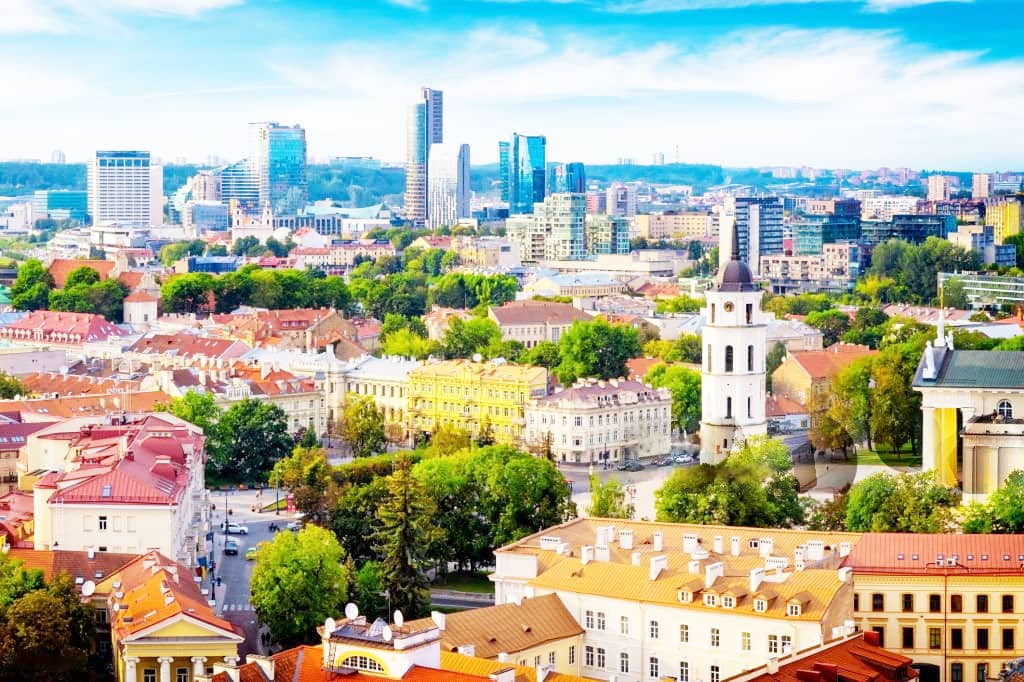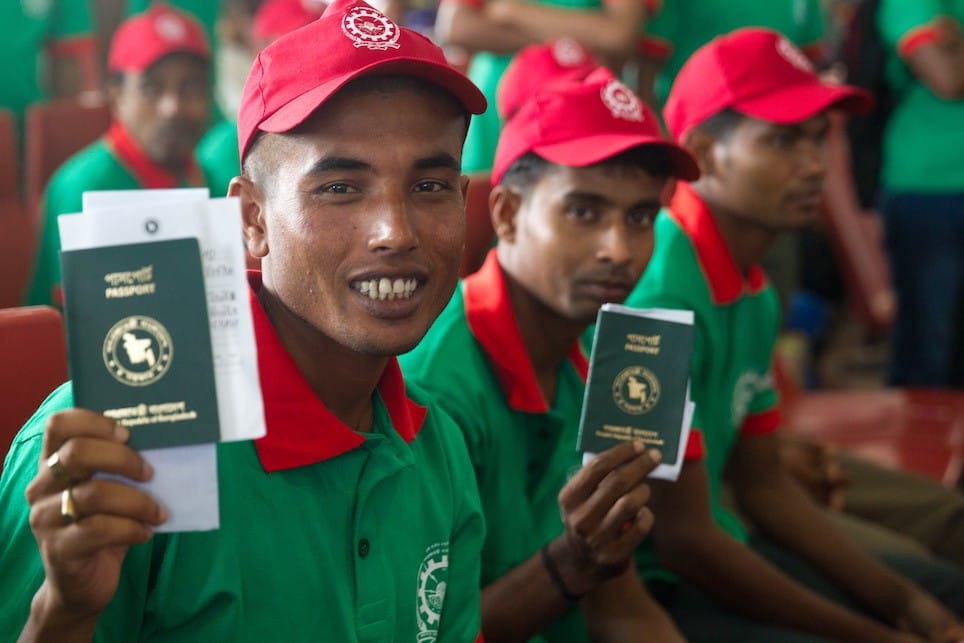Introduction to Lithuania’s Work Permit System
Lithuania offers a structured work permit system to streamline the entry of foreign nationals who wish to work within its borders in Lithuanian Work Permit with a Temporary Residence Permit. The system is characterized by regulations that adhere to both national legislation and European Union guidelines, ensuring a balanced approach to labor migration. We “Innovative Sustainability” a Lithuania-based company provides Lithuanian Work Permit across the globe.

Eligibility Criteria
To be eligible for a Lithuanian work permit, candidates must generally secure an offer of employment from a Lithuanian employer. The employer is tasked with proving that the position could not be filled by a candidate from the local or EU labor market this is known as the labor market test.
Types of Work Permits
There are several types of Lithuanian Work Permits available in Lithuania:
General Work Permit: For individuals planning to engage in standard employment. EU Blue Card: Highly skilled professionals can apply for this card, facilitating easier mobility within EU member states.
Temporary Residence Permit: Besides work authorization, this Temporary Residence Permit allows one to reside in Lithuania for a specific period.
Application Process
The work permit application process involves several steps:
Offer of employment from a Lithuanian company. Labor market test conducted by the employer. Submission of the required documents, including a valid passport and educational qualifications for Lithuanian Work Permit. Application review by the Lithuanian Labor Exchange and the Migration Department.
The processing time can vary, and applicants should ensure all information provided is accurate to prevent delays.
Regulatory Framework
Lithuania’s work permit regulations are enforced by the Migration Department under the Ministry of the Interior. Compliance with these rules is imperative to maintain the legal standing of foreign workers in Lithuania for Lithuanian Work Permit.
Understanding Lithuanian work permit system is fundamental for prospective foreign employees and employers alike. Accurate knowledge of the process, types of permits, and regulatory requirements is essential for a smooth and lawful employment experience in Lithuania.
Eligibility Criteria for a Lithuanian Work Permit
Understanding the eligibility criteria for obtaining a Lithuanian work permit with Temporary Residence Permit is crucial for foreign nationals seeking employment in Lithuania. Here are the primary qualifications that applicants must meet for Lithuanian Work Permit:
Non-EU/EEA Residency: Applicants usually must be from outside the EU/EEA area as EU/EEA nationals have the freedom to work in Lithuania without a Lithuanian Work Permit.
Job Offer: Possession of a valid job offer from a Lithuanian employer is mandatory. The job must typically be in an area where there is a shortage of suitable local or EU labor.
Professional Qualifications: The applicant should possess the appropriate qualifications, skills, and experience for the job under Lithuanian Work Permit. These qualifications may need to be recognized by the relevant Lithuanian authorities.
Salary Requirements: The offered salary must comply with the minimum salary requirements set by the Lithuanian government, ensuring that it is sufficient for the cost of living and comparable to local standards for Lithuanian Work Permit.
Health Insurance: A comprehensive health insurance policy is usually required, covering the entire duration of the employment contract.
Clear Criminal Record: A clear criminal record certificate may be necessary, indicating that the applicant has no history of legal violations.
Legal Entry and Stay: The individual must have legally entered Lithuania and have the right to stay in the country while the work permit application is processed for Lithuanian Work Permit.
Additionally, specific sector-based or investor-based permits may have unique criteria:
Sector-Specific: Certain fields such as IT, engineering, or healthcare may have specialized work permits with different requirements for Lithuanian Work Permit.
Investors and Business Owners: Different criteria apply to entrepreneurs planning to conduct business or invest in Lithuania.
Compliance with these criteria does not automatically guarantee the issuance of a Lithuanian work permit, as the decision ultimately lies with the Migration Department. It is advisable to check the most current regulations or consult with legal professionals before applying.
Types of Lithuanian Work Permits and Their Specific Requirements
In Lithuania, there are primarily two types of Lithuanian Work Permits available for non-EU citizens: the Type A and Type B work permits.
Type A Work Permits
A Type A work permit aligns with general employment and is required for foreign nationals who wish to work in Lithuania under Lithuanian Work Permit. Specific requirements for a Type A permit include:
A valid employment contract or binding job offer in Lithuania. Confirmation that the position cannot be adequately filled by a Lithuanian national or other EU citizen. A salary offer that complies with the minimum set by Lithuanian law for the specific job. Documentation confirming the applicant’s qualifications or expertise relevant to the job offer. A valid passport or other travel document. Health insurance covering the duration of stay under Lithuanian Work Permit.
Type A permits are usually linked to the employer, which means changing jobs would require obtaining a new permit.
Type B Work Permits
Type B work permits are issued to foreign nationals who meet one of the following criteria:
Corporate executives or board members. High-level managers involved in overseeing a Lithuanian company’s operations for Lithuanian Work Permit. Professionals sent to Lithuania on intra-company transfers.
Requirements for a Type B permit include:
Evidence of the individual’s position within the company (e.g., appointment letter or company resolution). Details of the Lithuanian company, including its registration and economic activity. Proof of the individual’s qualifications and professional experience. A labor contract or an equivalent legal act governing work to be conducted in Lithuania. A valid passport or other travel documentation. Health insurance valid for the length of the assignment.
Both types of Lithuanian Work Permits require the employer to initiate the application process on behalf of the employee. It’s also key to note that some highly skilled professionals might be eligible for a Blue Card, a combined residence and work permit for highly qualified employment, which has its own specific criteria and advantages.
The Role of Employers in the Lithuanian Work Permit Process
In Lithuania, the Lithuanian Work Permit process is an intricate procedure wherein employers play a crucial part. To navigate this system effectively, there are specific requirements and steps that must be followed:
Job Vacancy Announcement: Before seeking international workers, employers must advertise the job vacancy in the Lithuanian Labour Exchange for at least 30 days. This is to ensure that local citizens have the first opportunity to apply for Lithuanian Work Permit.
Work Permit Application: Employers are responsible for initiating the Lithuanian Work Permit application process on behalf of their prospective foreign employee. They must gather and submit all necessary documents to the Lithuanian Labour Exchange. These typically include the job description, the foreigner’s qualification documents, and evidence that no suitable local candidate was found.
Offer of Employment: Once the Labour Exchange approves the application, the employer must provide the foreign candidate with an official offer of employment. This document serves as a crucial component of the foreign worker Lithuanian Work Permit application.
Collaboration with Migration Authorities: Throughout the application process, employers must collaborate with the Lithuanian migration authorities, responding to any queries and providing additional documentation as requested for Lithuanian Work Permit.
Notification of Lithuanian Work Permit Issuance: When the work permit is granted, the employer must inform the foreign employee. It falls on the employer to ensure the potential employee is aware of the work permit’s validity period and any other conditions associated with it.
Assisting with Temporary Residence Permits: Although not a direct responsibility, it is often in the employer’s interest to assist the worker in obtaining a Temporary Residence Permit, which is usually required to legally reside and work in Lithuania under Lithuanian Work Permit.
Record Keeping: Employers must maintain records of all foreign workers, their work permits, and terms of employment, for the duration of their employment and as mandated by Lithuanian law.
Employers must act in good faith and within the legal framework, as non-compliance can lead to penalties and jeopardize future applications. Through understanding and fulfilling their role, employers can ensure a smooth transition for their international employees into the Lithuanian workforce.
Step-by-Step Guide to Applying for a Lithuanian Work Permit in Lithuania
Applying for a Lithuanian Work Permit in Lithuania is a straightforward process that involves the following steps:
Secure a Job Offer:
Before initiating the application for a work permit, the applicant must have a job offer from a Lithuanian employer. The job offer should be for a position that cannot be easily filled by a Lithuanian or EU citizen.
Employer Initiates Application:
It is the responsibility of the Lithuanian employer to start the Lithuanian Work Permit application process on behalf of the foreign employee. The employer must first prove that there are no suitable candidates within Lithuania or the EU.
Prepare Required Documents:
The applicant must gather the necessary documents, which include:
A valid passport. Photographs. Educational and professional qualification certificates. A completed application form. Proof of accommodation in Lithuania. A health insurance policy valid in Lithuania.
Labor Market Test:
The employer needs to pass the labor market test, demonstrating that the job position was advertised locally for at least one month and no suitable candidate was found within the country or the EU.
Submission of Application:
Once the labor market test is passed, the employer can submit the Lithuanian Work Permit application and the gathered documents to the Lithuanian Labor Exchange.
Wait for Approval:
After the submission, the applicant waits for the decision. The processing time can take up to a few months. If approved, the Lithuanian Work Permit is issued.
Apply for National Visa (D):
If the applicant is from a country that requires a visa, they must apply for a National Visa (D) to enter Lithuania for work purposes.
Register Upon Arrival:
After arriving in Lithuania, the foreign employee must register with the local Migration Department and declare their place of residence.
Following these essential steps carefully will enhance the likelihood of successfully obtaining a Lithuanian Work Permit in Lithuania.
Document Checklists for Lithuania Work Permit Application
When applying for a Lithuanian Work Permit in Lithuania, you must present a comprehensive set of documents to verify your identity, qualifications, and the legitimacy of the job offer. Below is a checklist to assist you in preparing your application:
Fully Completed Application Form: Obtain the latest Lithuanian Work Permit application form from the Lithuanian migration office or their official website and fill it out completely.
Valid Passport: Submit a copy of your valid passport with at least two blank pages for stamps. Ensure that your passport’s validity extends at least three months past the intended stay in Lithuania.
Photographs: Provide two passport-sized color photographs, taken within the last six months and meeting the required specifications.
Job Offer Letter: Attach a copy of your job offer letter from the Lithuanian employer, detailing the nature of work, salary, and contract duration.
Educational and Professional Qualifications: Include certified copies of your degrees, diplomas, certificates, and references from previous employers.
Proof of Accommodation: Furnish evidence of a place to stay in Lithuania, which can be a rental agreement or a letter from the employer providing accommodation.
Medical Insurance: Provide proof of health insurance coverage that is valid in Lithuania for the duration of your Lithuanian Work Permit.
Criminal Record Certificate: Obtain a certificate from your home country or any country you have resided in for the past 12 months, proving you have no criminal record.
Payment Receipt: Include the receipt for the processing fee for the Lithuanian Work Permit application.
The documents must be translated into Lithuanian or English and notarized, if applicable. It’s also important to check with the Lithuanian embassy or consulate for any country-specific requirements or additional documents that may be needed. Double-checking the application and document list for completeness can prevent delays in the processing of your Lithuania work permit application.
Navigating the Legal Aspects: Employment Laws and Regulations
When planning to work in Lithuania, it is crucial to familiarize oneself with the local employment laws and regulations to ensure compliance. Lithuania adheres to EU standards, but also has its own set of national labor laws that govern work permits, employment contracts, labor rights, and employer obligations.
Obtaining a Lithuanian Work Permit: Non-EU nationals must secure a Lithuanian Work Permit, which is usually facilitated by the employer. The process involves the employer proving that there is no suitable EU candidate for the job. It is essential to understand the specific criteria and categories that may apply to your situation.
Employment Contracts: Employment contracts in Lithuania must be written in Lithuanian and in alignment with the Labor Code. They define the terms and conditions of employment, including duties, salary, working hours, and termination procedures.
Labor Rights: Employees in Lithuania are afforded a range of rights, including annual leave, minimum wage, statutory working hours, and health and safety regulations. Familiarizing yourself with these laws can help you understand your entitlements as a foreign worker.
Employer Obligations: Employers have legal obligations to register workers with social security and the tax office, provide a healthy and safe working environment, and adhere to non-discrimination policies.
To navigate these legal waters effectively:
It is advisable to consult with a Lithuanian legal expert or an immigration lawyer who can provide guidance tailored to one’s personal circumstances.
Preparation is key – gather all required documentation well in advance and ensure that they are properly translated and notarized if needed.
Stay updated on changes to employment laws and regulations as Lithuania continues to evolve its workforce guidelines in line with EU integration and economic development.
Processing Times and Fees: What to Expect
When applying for a Lithuanian Work Permit in Lithuania, it is crucial to understand the associated processing times and fees, as they vary depending on the type of permit and the specifics of the application.
Processing Times
Generally, the processing time for a Lithuanian work permit is as follows:
Initial Review: After submission, the initial review of an application can take up to 10 working days. Final Decision: Following the initial assessment, the final decision can take up to 2 months (60 days) if additional documents or clarification are not required. Expedited Processing: In some cases, expedited processing may be available for an additional fee. This can reduce the waiting period significantly.
Applicants should plan for potential delays, as processing times can fluctuate based on the volume of applications received and the specific circumstances of the case.
Fees
The costs associated with obtaining a Lithuanian Work Permit in Lithuania are as follows:
Application Fee: This fee is mandatory and varies depending on the type of work permit. As of the knowledge cutoff date, the fee generally ranges from euro 160 to 320. Expedited Service Fee: When available, expedited processing incurs extra charges on top of the standard application fee. Renewal Fee: For renewing a Lithuanian Work Permit, applicants should expect to pay a fee similar to the initial application.
It’s important to note that fees are subject to change, so applicants should check with the Lithuanian Migration Department or official sources for the most current fee schedule.
Applicants should be prepared to cover these costs without expecting reimbursement, as most Lithuanian Work Permit-related fees are non-refundable, even if the application is unsuccessful. For an accurate and smooth application process, budgeting for both the processing times and fees is essential.
Tips for a Successful Lithuania Work Permit Application
To increase the likelihood of securing a Lithuanian Work Permit in Lithuania, individuals need to follow a well-prepared approach. Here are several essential tips one should consider throughout the application process:
Gather Accurate Information: Before beginning the Lithuanian Work Permit application, it is crucial to research and understand the specific requirements and criteria for obtaining a Lithuanian work permit. Any misinformation can result in delays or rejection.
Complete Documentation Thoroughly: Ensure all forms are filled out completely and accurately. Double-check for any mistakes or omissions that could hinder the approval for Lithuanian Work Permit process.
Provide Verifiable Documents: Attach all required documents, including passport, job offer from a Lithuanian employer, and any educational or professional certificates. These should be verifiable and, if necessary, translated into Lithuanian or another accepted language.
Meet Health and Character Requirements: Be prepared to undergo health checks and provide evidence of good character, such as a clean criminal record. These are standard prerequisites for many countries, including Lithuania.
Comply with Local Labor Market Tests: Understand if a local labor market test applies to your situation, which assesses whether a Lithuanian or EU citizen could fill the position.
Apply Early: Start the application process for Lithuanian Work Permit well in advance of the intended start date of employment to account for processing times, which can take several months.
Consult with Experts: Consider seeking advice from immigration consultants or lawyers who specialize in Lithuanian immigration law. They can provide valuable insight into the application process and increase the chances of a favorable outcome.
Track the Application: After submission, monitor the status of your application and respond promptly to any requests from the Lithuanian migration department for Lithuanian Work Permit.
By following these guidelines, applicants can position themselves for a smoother Lithuanian Work Permit application process in Lithuania, reducing the likelihood of unwelcome surprises and ensuring that every possible advantage is secured.
Dealing with Rejection: Next Steps After a Denied Application
When confronted with a Lithuanian Work Permit application denial in Lithuania, applicants should first seek to understand the reasons behind the rejection. Authorities are required to provide explanations for their decisions, which can be key in determining the next steps.
Review the rejection letter: Carefully read the provided documentation to pinpoint specific grounds for refusal. This might be due to incomplete applications, lack of supporting documents, or failure to meet eligibility criteria.
Consult an expert: Legal advisors or immigration specialists can offer clarity on complex regulatory requirements and suggest an effective course of action.
Correct and resubmit: If the denial is due to fixable issues, address the requirements and resubmit the application for Lithuanian Work Permit. Ensure that all information is accurate and complete to avoid further delays.
Appeal the decision: If there is a discrepancy or if the applicant believes the decision was unjust, there is usually the right to appeal. This process necessitates a formal letter outlining the reasons for contesting the rejection, submitted within the stipulated deadline.
It’s critical to keep timelines in mind an appeals and resubmissions are time-sensitive. Any further steps should be acted upon promptly to avoid falling out of legal status, if the applicant is already in Lithuania, or to maintain the momentum of the immigration process. It is also beneficial to keep a positive mindset, as rejections can sometimes be part of the journey in securing a Work Permit. Adhering to these steps with diligence increases the likelihood of a favorable outcome on subsequent attempts.
Renewal and Permanent Residency: Long-Term Considerations
Obtaining a Lithuanian Work Permit in Lithuania is an important step for non-EU citizens seeking employment in the country. However, individuals must consider long-term aspects, such as permit renewal and pathways to permanent residency.
To maintain legal employment status, Work Permit holders must be vigilant about the expiration date of their current permit. Renewal applications should be initiated well in advance, typically at least two months before the permit expires. The process includes:
Confirming continued employment with the current or a new employer. Providing updated documents, such as a valid passport and evidence of accommodation. Ensuring compliance with any changes in Lithuanian immigration law.
For those aiming to transition from temporary Work Permit to permanent residency, it is crucial to be aware of the eligibility criteria. Permanent residency is often contingent on a continuous period of legal residence, which, in Lithuania, is usually five years. Additionally, applicants should demonstrate:
Sustained employment and financial stability. Basic proficiency in the Lithuanian language. A clear understanding of Lithuanian civics and history if required by the immigration authorities.
Permanent residents gain several benefits, including:
Unrestricted access to the Lithuanian labor market. Eligibility for social security and health care benefits on par with Lithuanian citizens. The right to reside indefinitely within the country.
It is advisable for Lithuanian Work Permit holders to keep these long-term considerations in mind from the outset. Staying informed about relevant regulations, maintaining clear employment records, and integrating into the local community can greatly smooth the transition from a temporary work setting to establishing permanent roots in Lithuania.
Conclusion: Integrating into the Lithuanian Workplace
Successfully obtaining a Lithuanian Work Permit is only the initial step in your journey to becoming a part of the Lithuanian workforce. Once you have navigated through the legal requirements and finally arrived in Lithuania, integrating into the workplace involves understanding and embracing the cultural nuances and professional expectations of this Baltic country.
Learn the Language: While English is widely spoken in business circles, a basic knowledge of Lithuanian is greatly appreciated and can open doors to more personal connections with colleagues and clients.
Understand the Culture: Lithuanians value direct communication and punctuality. Ensure you are always on time and straightforward in your business dealings.
Social Etiquette: A firm handshake is the common greeting, and initial conversations generally avoid personal topics. Observe the etiquette and follow the lead of colleagues in social settings.
Hierarchy and Decision Making: Be aware of the hierarchical nature of Lithuanian businesses and respect the decision-making process, which may involve several layers of management.
Work-Life Balance: While Lithuanians are hardworking, they also maintain a clear work-life balance. Respecting this balance is key to building good work relationships.
Lastly, it is essential to be patient and flexible. The process of adapting to a new working environment and culture takes time, and there may be unexpected challenges along the way. Nevertheless, with an open mind and a willingness to learn, integration into the Lithuanian workplace can be a rewarding experience that enhances your professional growth and personal development. Remember that your work permit is not only a legal document but also a gateway to a unique cultural and professional adventure.



